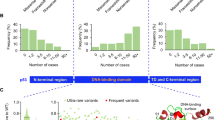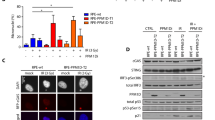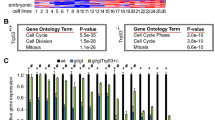Abstract
The cyclin-dependent kinase inhibitor p16INK4a can induce senescence of human cells, and its loss by deletion, mutation or epigenetic silencing is among the most frequently observed molecular lesions in human cancer1,2. Overlapping reading frames in the INK4A/ARF gene encode p16INK4a and a distinct tumour-suppressor protein, p19ARF (ref. 3). Here we describe the generation and characterization of a p16Ink4a-specific knockout mouse that retains normal p19Arf function. Mice lacking p16Ink4a were born with the expected mendelian distribution and exhibited normal development except for thymic hyperplasia. T cells deficient in p16Ink4a exhibited enhanced mitogenic responsiveness, consistent with the established role of p16Ink4a in constraining cellular proliferation. In contrast to mouse embryo fibroblasts (MEFs) deficient in p19Arf (ref. 4), p16Ink4a-null MEFs possessed normal growth characteristics and remained susceptible to Ras-induced senescence. Compared with wild-type MEFs, p16Ink4a-null MEFs exhibited an increased rate of immortalization, although this rate was less than that observed previously for cells null for Ink4a/Arf, p19Arf or p53 (refs 4, 5). Furthermore, p16Ink4a deficiency was associated with an increased incidence of spontaneous and carcinogen-induced cancers. These data establish that p16Ink4a, along with p19Arf, functions as a tumour suppressor in mice.
This is a preview of subscription content, access via your institution
Access options
Subscribe to this journal
Receive 51 print issues and online access
$199.00 per year
only $3.90 per issue
Buy this article
- Purchase on SpringerLink
- Instant access to full article PDF
Prices may be subject to local taxes which are calculated during checkout




Similar content being viewed by others
References
Ruas, M. & Peters, G. The p16INK4a/CDKN2A tumor suppressor and its relatives. Biochim. Biophys. Acta 1378, F115–F177 (1998).
Sharpless, N. E. & DePinho, R. A. The INK4A/ARF locus and its two gene products. Curr. Opin. Genet. Dev. 9, 22–30 (1999).
Quelle, D. E., Zindy, F., Ashmun, R. A. & Sherr, C. J. Alternative reading frames of the INK4a tumor suppressor gene encode two unrelated proteins capable of inducing cell cycle arrest. Cell 83, 993–1000 (1995).
Kamijo, T. et al. Tumor suppression at the mouse INK4a locus mediated by the alternative reading frame product p19ARF. Cell 91, 649–659 (1997).
Serrano, M. et al. Role of the INK4a locus in tumor suppression and cell mortality. Cell 85, 27–37 (1996).
Lakso, M. et al. Efficient in vivo manipulation of mouse genomic sequences at the zygote stage. Proc. Natl Acad. Sci. USA 93, 5860–5865 (1996).
Pham, C. T., MacIvor, D. M., Hug, B. A., Heusel, J. W. & Ley, T. J. Long-range disruption of gene expression by a selectable marker cassette. Proc. Natl Acad. Sci. USA 93, 13090–13095 (1996).
Zindy, F., Quelle, D. E., Roussel, M. F. & Sherr, C. J. Expression of the p16INK4a tumor suppressor versus other INK4 family members during mouse development and aging. Oncogene 15, 203–211 (1997).
Alcorta, D. A. et al. Involvement of the cyclin-dependent kinase inhibitor p16 (INK4a) in replicative senescence of normal human fibroblasts. Proc. Natl Acad. Sci. USA 93, 13742–13747 (1996).
Rogan, E. M. et al. Alterations in p53 and p16INK4 expression and telomere length during spontaneous immortalization of Li-Fraumeni syndrome fibroblasts. Mol. Cell. Biol. 15, 4745–4753 (1995).
Reznikoff, C. A. et al. Elevated p16 at senescence and loss of p16 at immortalization in human papillomavirus 16 E6, but not E7, transformed human uroepithelial cells. Cancer Res. 56, 2886–2890 (1996).
Serrano, M., Lin, A. W., McCurrach, M. E., Beach, D. & Lowe, S. W. Oncogenic ras provokes premature cell senescence associated with accumulation of p53 and p16INK4a. Cell 88, 593–602 (1997).
Dimri, G. P. et al. A biomarker that identifies senescent human cells in culture and in aging skin in vivo. Proc. Natl Acad. Sci. USA 92, 9363–9367 (1995).
Carnero, A., Hudson, J. D., Price, C. M. & Beach, D. H. p16INK4A and p19ARF act in overlapping pathways in cellular immortalization. Nature Cell Biol. 2, 148–155 (2000).
Dannenberg, J. H., van Rossum, A., Schuijff, L. & te Riele, H. Ablation of the retinoblastoma gene family deregulates G(1) control causing immortalization and increased cell turnover under growth-restricting conditions. Genes Dev. 14, 3051–3064 (2000).
Sage, J. et al. Targeted disruption of the three Rb-related genes leads to loss of G(1) control and immortalization. Genes Dev. 14, 3037–3050 (2000).
Groth, A., Weber, J. D., Willumsen, B. M., Sherr, C. J. & Roussel, M. F. Oncogenic Ras induces p19ARF and growth arrest in mouse embryo fibroblasts lacking p21Cip1 and p27Kip1 without activating cyclin D-dependent kinases. J. Biol. Chem. 275, 27473–27480 (2000).
Kamijo, T., Bodner, S., van de Kamp, E., Randle, D. H. & Sherr, C. J. Tumor spectrum in ARF-deficient mice. Cancer Res. 59, 2217–2222 (1999).
Zhang, S., Ramsay, E. S. & Mock, B. A. Cdkn2a, the cyclin-dependent kinase inhibitor encoding p16INK4a and p19ARF, is a candidate for the plasmacytoma susceptibility locus, Pctr1. Proc. Natl Acad. Sci. USA 95, 2429–2434 (1998).
Zhang, S. L. et al. Efficiency alleles of the Pctr1 modifier locus for plasmacytoma susceptibility. Mol. Cell. Biol. 21, 310–318 (2001).
Linardopoulos, S. et al. Deletion and altered regulation of p16INK4a and p15INK4b in undifferentiated mouse skin tumors. Cancer Res. 55, 5168–5172 (1995).
Swafford, D. S. et al. Frequent aberrant methylation of p16INK4a in primary rat lung tumors. Mol. Cell. Biol. 17, 1366–1374 (1997).
Herzog, C. R., Noh, S., Lantry, L. E., Guan, K. L. & You, M. Cdkn2a encodes functional variation of p16INK4a but not p19ARF, which confers selection in mouse lung tumorigenesis. Mol. Carcinog. 25, 92–98 (1999).
Patel, A. C. et al. Hypermethylation of the p16 (Ink4a) promoter in B6C3F1 mouse primary lung adenocarcinomas and mouse lung cell lines. Carcinogenesis 21, 1691–1700 (2000).
Buchmann, A., Ruggeri, B., Klein-Szanto, A. J. & Balmain, A. Progression of squamous carcinoma cells to spindle carcinomas of mouse skin is associated with an imbalance of H-ras alleles on chromosome 7. Cancer Res. 51, 4097–4101 (1991).
Herman, J. G., Graff, J. R., Myohanen, S., Nelkin, B. D. & Baylin, S. B. Methylation-specific PCR: a novel PCR assay for methylation status of CpG islands. Proc. Natl Acad. Sci. USA 93, 9821–9826 (1996).
Herman, J. G. et al. Inactivation of the CDKN2/p16/MTS1 gene is frequently associated with aberrant DNA methylation in all common human cancers. Cancer Res. 55, 4525–4530 (1995).
Carrasco, D. et al. Multiple hemopoietic defects and lymphoid hyperplasia in mice lacking the transcriptional activation domain of the c-Rel protein. J. Exp. Med. 187, 973–984 (1998).
Naviaux, R. K., Costanzi, E., Haas, M. & Verma, I. M. The pCL vector system: rapid production of helper-free, high-titer, recombinant retroviruses. J. Virol. 70, 5701–5705 (1996).
Matsushime, H. et al. D-type cyclin-dependent kinase activity in mammalian cells. Mol. Cell. Biol. 14, 2066–2076 (1994).
Acknowledgements
We thank E. Farazi, S. Chan, M. Sinha, S. Alson and the Dana Farber Cancer Institute Mouse Core for experimental advice and assistance. We also thank H. Westphal, T. Devereux, M. Oren, M. Bosenberg, D. Silver and A. Buchmann for advice or reagents, and L. Chin, J. DeCaprio, W. Kaelin and P. Sicinski for comments on the manuscript. N.E.S. is an Howard Hughes Medical Institute Physician Postdoctoral Fellow; N.B. is supported by the American Cancer Society John Peter Hoffman Award; K.H.L. is supported by the National Nuclear R and D Program and Human Genome Program from the Korean Ministry of Science and Technology; D.H.C. is supported by a Physician Scientist Fellowship of the Damon Runyon–Walter Winchell Foundation; and R.A.D. is an American Cancer Society Professor and recipient of the Steven and Michele Kirsch Foundation Investigator Award. This work was supported by grants from the National Institutes of Health, the National Cancer Institute and the American Cancer Society.
Author information
Authors and Affiliations
Corresponding author
Supplementary information
Rights and permissions
About this article
Cite this article
Sharpless, N., Bardeesy, N., Lee, KH. et al. Loss of p16Ink4a with retention of p19Arf predisposes mice to tumorigenesis. Nature 413, 86–91 (2001). https://doi.org/10.1038/35092592
Received:
Accepted:
Issue Date:
DOI: https://doi.org/10.1038/35092592
This article is cited by
-
Immortalized murine tenocyte cells: a novel and innovative tool for tendon research
Scientific Reports (2023)
-
Cellular senescence and neurodegeneration
Human Genetics (2023)
-
Comprehensive Analysis of Cellular Senescence-Related Genes in Prognosis, Molecular Characterization and Immunotherapy of Hepatocellular Carcinoma
Biological Procedures Online (2022)
-
Research models and mesenchymal/epithelial plasticity of osteosarcoma
Cell & Bioscience (2021)
-
PDGFRβ is an essential therapeutic target for BRCA1-deficient mammary tumors
Breast Cancer Research (2021)



